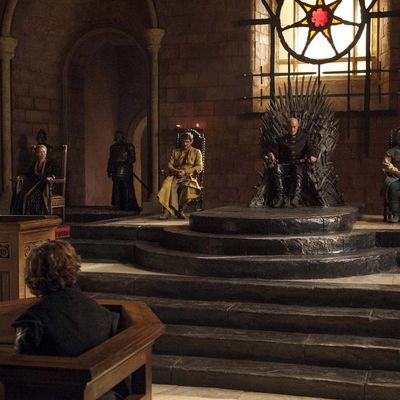
On tonightÔÇÖs episode of Game of Thrones, Tyrion went on trial. He was accused of a crime he didnÔÇÖt commit ÔÇö again. But in Westeros, the accused donÔÇÖt have very many rights, if any. The right to a fair trial, or counsel, or due process ÔÇö these are foreign concepts in KingÔÇÖs Landing, where no judge recuses himself just because heÔÇÖs the father of the person on trial, or the grandfather of the victim in question. Impartial judges? What are those?
Last time Tyrion faced charges (when Catelyn Stark accused him of a murder attempt on her son Bran, and then her sister Lysa Arryn accused him of the murder of her husband, a crime we learned last week that she herself committed), he demanded a trial. And when it turned out that LysaÔÇÖs son would be his judge, he opted for a trial by combat. ÔÇ£I understand the law,ÔÇØ Tyrion told the court then. But what is the law in Westeros?
Ultimately, the law is determined by whoever is king, or whoever he deems stand in his place, as Tommen did tonight with his grandfather Tywin. That personÔÇÖs word is law, and he can determine sentences at his discretion. And so far, their responses to criminal suspects were common to those in medieval times. Someone breaks an oath? Death. Someone steals or smuggles something? They get flogged, or in some instances, lose a hand or fingers (see DavosÔÇÖs hand). Someone commits rape? Castration. Although flaying is outlawed, the Boltons still use it as a punishment ÔÇö poor Theon.
If a lord or king sentences someone to death, there are a variety of methods at their disposal ÔÇö hanging, beheading, and burning being just a few. (The latter a preference of the followers of the Lord of Light, MelisandreÔÇÖs religion). Ned Stark believed that the man who passes the sentence should also be the one to hear someoneÔÇÖs last words and to swing the sword ÔÇö which is why our introduction to him was as a family man who brought his sons to witness his beheading a deserter of the NightÔÇÖs Watch. Someone who broke an oath to the NightÔÇÖs Watch isnÔÇÖt usually granted leniency, since taking the black in the first place was usually in exchange for a pardon for another crime. (Women, however, didnÔÇÖt have the option).
During a trial by lord, evidence must be brought forward, and witnesses must testify. Cross-examination is even allowed. The trial will often start with a prayer from a Septon asking the Father (one┬áof the Seven) to guide them towards justice, and that Septon will make witnesses swear an oath of honesty before testifying. In earlier times, the High Septons would appoint seven judges to try a case ÔÇö and if a woman is accused, three of those judges might be women.
But for this particular trial, Tyrion had three judges ÔÇö Tywin, Mace Tyrell, and Oberyn Martell.┬áThis is already a better circumstance for him than his last almost-trial by lord, when Lysa ArrynÔÇÖs little boy was to hear the evidence and make his judgment, because he wanted to ÔÇ£make the bad man flyÔÇØ out the Moon Door, even before evidence was heard. And while the audience might have known he was innocent this time, the ÔÇ£evidenceÔÇØ was stacked against him. All those times weÔÇÖve enjoyed┬áTyrion slapping Joffrey┬áor giving the boy-king a much-needed dressing-down now look like motive. Which is why he requested a trial by combat, which allows the accused to sidestep any actual trial. Tyrion knows that. If he or his champion (the person he chooses to fight on his behalf, as Bronn did at the Eyrie) remain alive at the end, he is exonerated, evidence be damned. But even if he or his champion dies, and heÔÇÖs declared guilty, Tyrion wins a victory against Tywin┬áÔÇö the Lannister line will die out. The only question is, who will be his champion?

